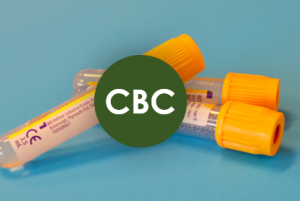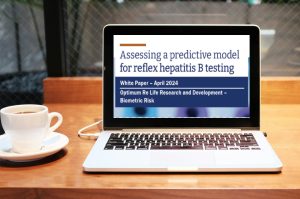Plus, are there long-term cardiovascular health risks from COVID-19?
The heart is a tiny but powerful organ whose work is indispensable to the rest of the body. This 1-pound organ pumps nearly 2,000 gallons of blood every day. This Heart Month, we examine three contributing factors insurers can consider when reviewing a life insurance applicant’s laboratory and medical history. We also highlight some early research that has been published on what complications COVID-19 may cause to the cardiovascular system.
Smoking has multiple health risk factors. In addition to lung and throat cancer, smoking can also lead to coronary heart disease, stroke and/or raised blood pressure. According to American Heart Association, smokers have a higher mortality risk than non-smokers and on average, die more than 10 years earlier than nonsmokers.
In a recent analysis, we discovered that 6.5% of all ExamOne life insurance applicants tested positive for cotinine from 2017 to 2019. Furthermore, we saw a 36.4% non-disclosure rate–meaning cotinine-positive applicants denied their tobacco use, something we refer to as ‘smoker’s amnesia.’ We also found that smokers had an increased risk of positivity for other drugs of abuse:
- 5x more likely to test positive for THC
- 15x more likely to test positive for cocaine
- 10x more likely to test positive for methamphetamines
High blood pressure increases the risk for heart disease and stroke
It is estimated that tens of millions of adults in the United States have high blood pressure, and most do not have it under control. It can lead to heart disease and stroke, two leading causes of death for Americans.
Our examiners are trained to take three blood pressure readings during the paramedical exam. Per Mayo Clinic recommendations, documenting a blood pressure reading multiple times helps verify accuracy. Additionally, if an applicant is or has been prescribed a blood pressure medication, results will be found in a prescription history report (up to seven years look-back). This provides insurers with information including the prescribing doctor, prescription adherence, a drug summary and prescription detail.
An elevated A1c could indicate an applicant is prediabetic or diabetic
It’s estimated that in 2018, 34.1 million adults aged 18 years or older—or 13.0% of all US adults—had diabetes and over 21% were unaware. Many times, applicants may be unaware they have this condition because they have not been tested and/or diagnosed. In fact, 34% of applicants with tested A1c values of 6.5 or higher stated they did not have diabetes during their telephone interview or on their application. The CDC also states that the risk of death from heart disease for adults with diabetes is higher than for adults who do not have diabetes.
COVID-19 and heart risks
While studies are still evaluating the effect COVID-19 has on the heart, here are some reference links on what has been discovered.
- COVID-19 long-term effects: This article from MayoClinic shares that imaging tests taken months after recovery from COVID-19 have shown lasting damage to the heart muscle, even in people who experienced only mild COVID-19symptoms. This may increase the risk of heart failure or other heart complications in the future.
The heart is a vital organ. By keeping it healthy, individuals reduce the likelihood of developing a chronic medical condition(s) later in life. Insurers can use real-time health data and laboratory results during the risk assessment process to better understand potential health risks for their life insurance applicants.




















Plus, are there long-term cardiovascular health risks from COVID-19?
The heart is a tiny but powerful organ whose work is indispensable to the rest of the body. This 1-pound organ pumps nearly 2,000 gallons of blood every day. This Heart Month, we examine three contributing factors insurers can consider when reviewing a life insurance applicant’s laboratory and medical history. We also highlight some early research that has been published on what complications COVID-19 may cause to the cardiovascular system.
Smoking contributes to one-third of coronary heart disease deaths
Smoking has multiple health risk factors. In addition to lung and throat cancer, smoking can also lead to coronary heart disease, stroke and/or raised blood pressure. According to American Heart Association, smokers have a higher mortality risk than non-smokers and on average, die more than 10 years earlier than nonsmokers.
In a recent analysis, we discovered that 6.5% of all ExamOne life insurance applicants tested positive for cotinine from 2017 to 2019. Furthermore, we saw a 36.4% non-disclosure rate–meaning cotinine-positive applicants denied their tobacco use, something we refer to as ‘smoker’s amnesia.’ We also found that smokers had an increased risk of positivity for other drugs of abuse:
High blood pressure increases the risk for heart disease and stroke
It is estimated that tens of millions of adults in the United States have high blood pressure, and most do not have it under control. It can lead to heart disease and stroke, two leading causes of death for Americans.
Our examiners are trained to take three blood pressure readings during the paramedical exam. Per Mayo Clinic recommendations, documenting a blood pressure reading multiple times helps verify accuracy. Additionally, if an applicant is or has been prescribed a blood pressure medication, results will be found in a prescription history report (up to seven years look-back). This provides insurers with information including the prescribing doctor, prescription adherence, a drug summary and prescription detail.
An elevated A1c could indicate an applicant is prediabetic or diabetic
It’s estimated that in 2018, 34.1 million adults aged 18 years or older—or 13.0% of all US adults—had diabetes and over 21% were unaware. Many times, applicants may be unaware they have this condition because they have not been tested and/or diagnosed. In fact, 34% of applicants with tested A1c values of 6.5 or higher stated they did not have diabetes during their telephone interview or on their application. The CDC also states that the risk of death from heart disease for adults with diabetes is higher than for adults who do not have diabetes.
COVID-19 and heart risks
While studies are still evaluating the effect COVID-19 has on the heart, here are some reference links on what has been discovered.
The heart is a vital organ. By keeping it healthy, individuals reduce the likelihood of developing a chronic medical condition(s) later in life. Insurers can use real-time health data and laboratory results during the risk assessment process to better understand potential health risks for their life insurance applicants.